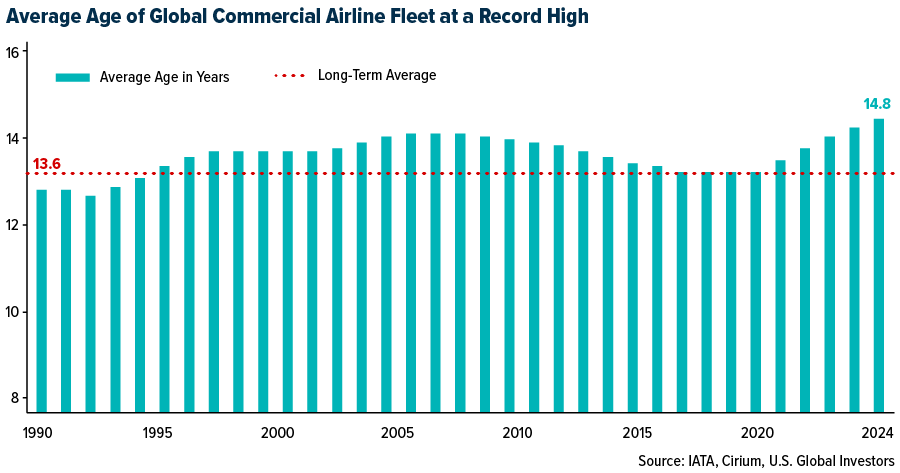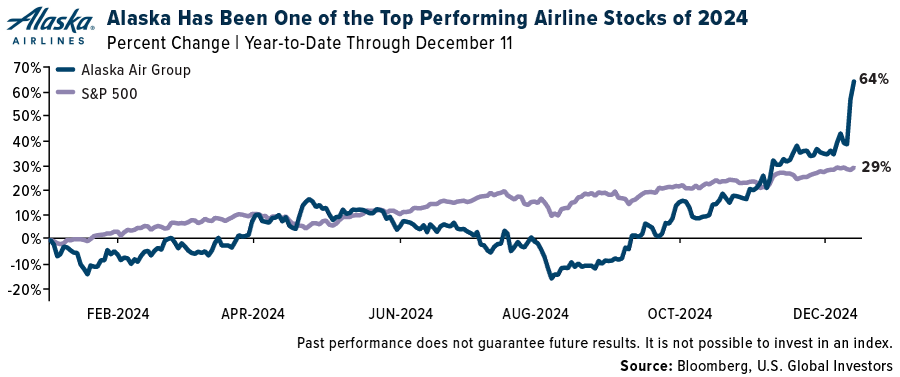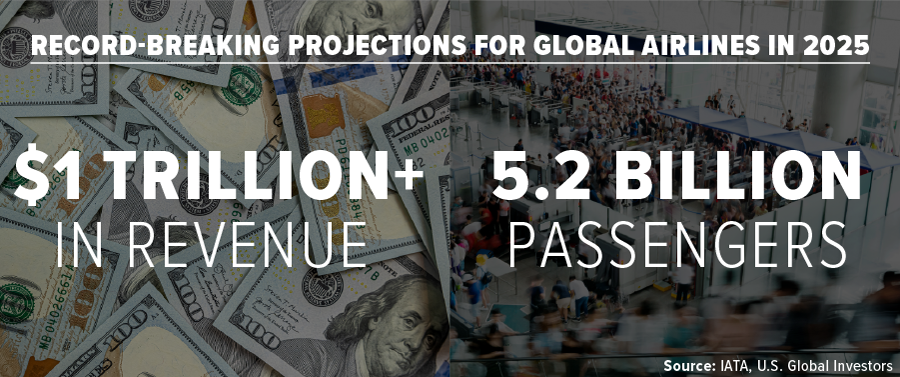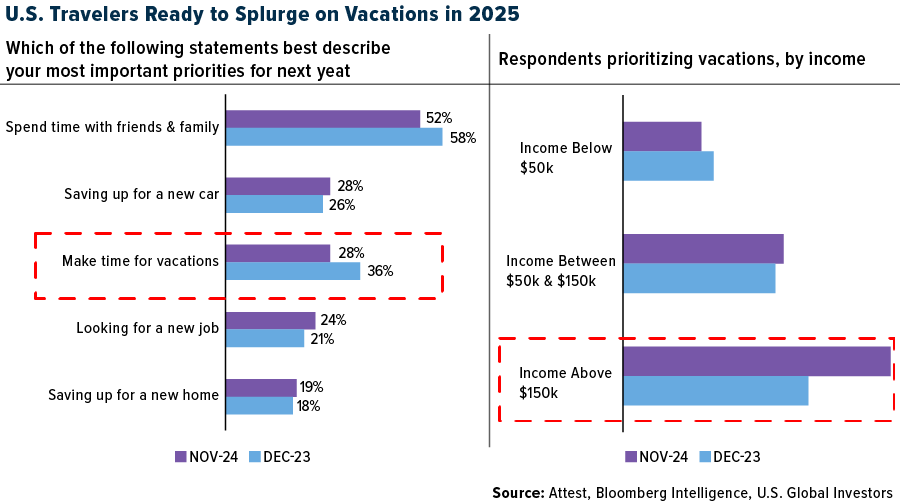The clouds hanging over Boeing’s operations finally appear to be clearing.
After a turbulent period of setbacks—including crashes, a global pandemic, supply chain snarls and a recent labor strike—Boeing has officially restarted production of the 737 MAX. And while the ramp-up will be gradual, the significance of this for the aviation industry can’t be overstated.
Why? Because the global fleet of commercial airliners has never been older, and carriers are under pressure to modernize.
That should be music to Boeing shareholders’ ears, but it’s also a positive indicator for the entire industry, which looks poised for a record-shattering 2025. With passenger numbers expected to hit record highs and airlines lifting their guidance, the tailwinds are undeniable.
An Aging Fleet Amid Soaring Demand
According to the International Air Transport Association (IATA), the average age of the global fleet of commercial aircraft now stands at 14.8 years—the highest on record. Compare that to the average long-term age of 13.6 years, and it’s clear that airlines are flying older planes for longer periods. These aging aircraft require more maintenance, more fuel and more repairs, all of which weigh on airlines’ bottom lines.

The silver lining? This presents a massive opportunity for new aircraft deliveries, and Boeing’s production restart couldn’t come at a better time. IATA estimates that 1,254 new planes will be delivered this year, potentially followed by 1,802 deliveries in 2025. That would be just shy of the record 1,813 aircraft that were delivered in 2018.
Boeing’s Bumpy Road to Recovery
Boeing’s journey back to full production has had its challenges. The recent strike by workers halted operations for more than 12 weeks, adding to the planemaker’s headaches. According to Reuters, U.S. regulators capped Boeing’s production at 38 jets per month following the midair blowout incident on an Alaska Air flight earlier this year.
But Boeing is resilient. With production resuming, analysts at Jefferies predict the company will average 29 737 MAX deliveries per month in 2025. That’s still below Boeing’s target of 56 per month, but it represents solid progress for the manufacturer.
Airline executives are taking notice. Alaska Air CEO Ben Minicucci recently acknowledged that while Boeing’s comeback is still a work-in-progress, he’s seeing “an improving trend” under the company’s new leadership.
A Billion-Dollar Vote of Confidence
Airlines themselves are brimming with optimism. Alaska, fresh off its acquisition of Hawaiian Airlines, recently announced a $1 billion share buyback program and issued strong financial guidance. The Seattle-based airline—one of the top performers of 2024, gaining 64% year-to-date—expects to post full-year adjusted earnings of at least $5.75 per share in 2025, exceeding Wall Street’s estimates.

Other major carriers are singing a similarly bullish tune. American Airlines raised its profit expectations for the final months of 2024, thanks to robust holiday demand, higher fares and lower fuel costs.
Southwest Airlines also lifted its revenue outlook, citing resilient travel demand and changes to its revenue management practices.
Record Revenues on the Horizon?
Looking ahead to 2025, the IATA projects total industry revenues to top $1 trillion for the first time in aviation history. Passenger numbers are expected to soar to 5.2 billion, a 6.7% increase from 2024 and another all-time high.

A recent Bloomberg Intelligence survey found that 36% of U.S. travelers plan to take vacations in 2025, up from 28% the previous year. High-income households are leading the charge, with 65% of those earning over $150,000 prioritizing vacations. This is a critical demographic for airlines, as premium travelers generate a disproportionate share of profits.

Wheel’s Up!
Boeing’s production restart is a signal that the industry’s supply-side challenges are being addressed. Meanwhile, surging demand and record-breaking projections for 2025 suggest that airlines are on the cusp of a new era of profitability.
For investors, travelers and industry stakeholders, we believe the outlook is undeniably bright. The sky’s the limit!
Interested in learning how you can invest in the airlines industry? Request information on the U.S. Global Jets ETF (NYSE: JETS) by clicking here!
Please carefully consider a fund’s investment objectives, risks, charges, and expenses. For this and other important information, obtain a statutory and summary prospectus for JETS by clicking here. Read it carefully before investing.
Investing involves risk, including the possible loss of principal. Shares of any ETF are bought and sold at market price (not NAV), may trade at a discount or premium to NAV and are not individually redeemed from the funds. Brokerage commissions will reduce returns. Because the funds concentrate their investments in specific industries, the funds may be subject to greater risks and fluctuations than a portfolio representing a broader range of industries. The funds are non-diversified, meaning they may concentrate more of their assets in a smaller number of issuers than diversified funds. The funds invest in foreign securities which involve greater volatility and political, economic and currency risks and differences in accounting methods. These risks are greater for investments in emerging markets.
The funds may invest in the securities of smaller-capitalization companies, which may be more volatile than funds that invest in larger, more established companies. The performance of the funds may diverge from that of the index. Because the funds may employ a representative sampling strategy and may also invest in securities that are not included in the index, the funds may experience tracking error to a greater extent than funds that seek to replicate an index. The funds are not actively managed and may be affected by a general decline in market segments related to the index.
Airline Companies may be adversely affected by a downturn in economic conditions that can result in decreased demand for air travel and may also be significantly affected by changes in fuel prices, labor relations and insurance costs.
Fund holdings and allocations are subject to change at any time. Click to view fund holdings for JETS.
Distributed by Quasar Distributors, LLC. U.S. Global Investors is the investment adviser to JETS.
All opinions expressed and data provided are subject to change without notice. Some of these opinions may not be appropriate to every investor.
The S&P 500 Stock Index is a widely recognized capitalization-weighted index of 500 common stock prices in U.S. companies
